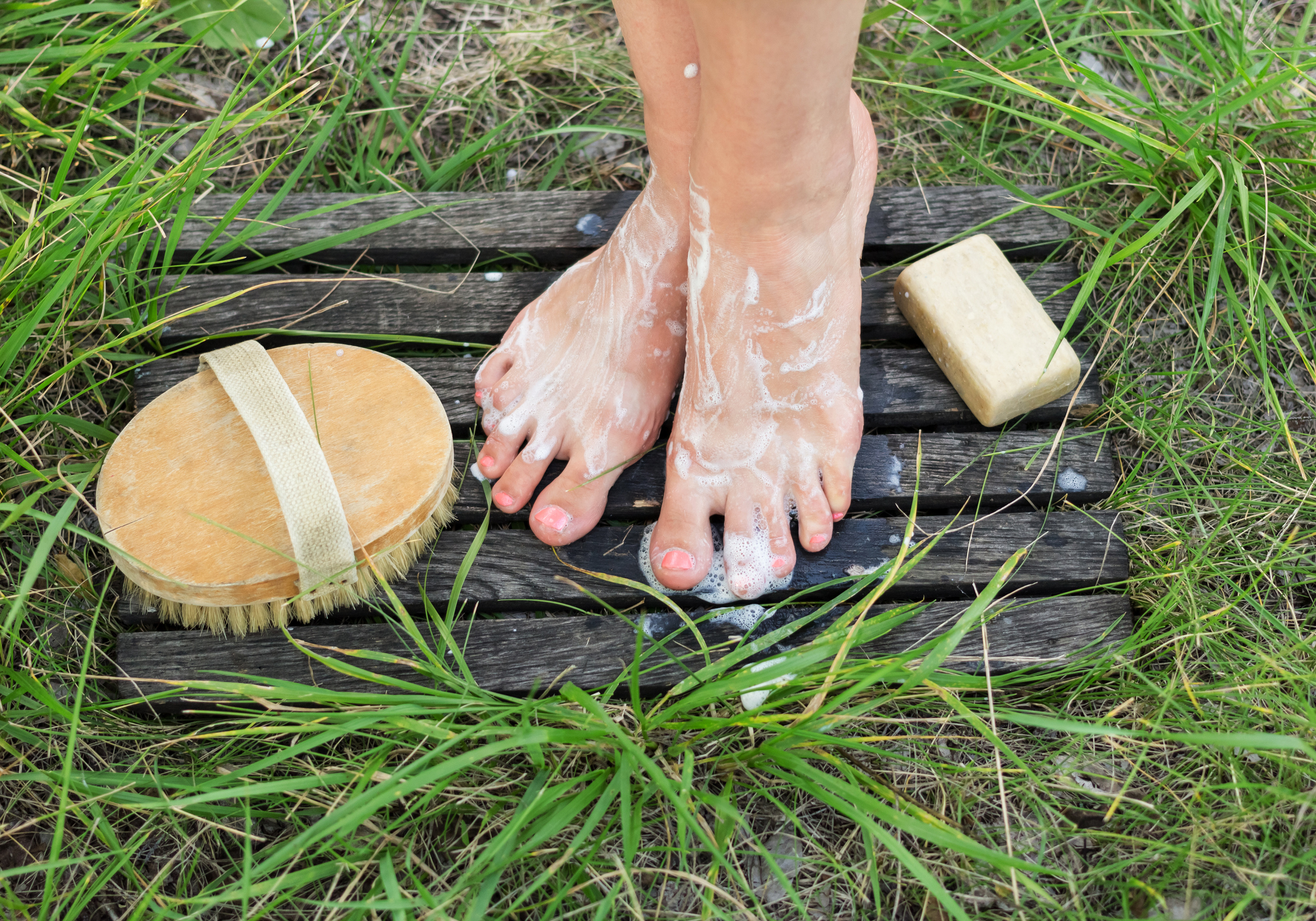Get Easy Health Digest™ in your inbox and don’t miss a thing when you subscribe today. Plus, get the free bonus report, Mother Nature’s Tips, Tricks and Remedies for Cholesterol, Blood Pressure & Blood Sugar as my way of saying welcome to the community!
How to clean your feet to avoid infection, fungus and warts

In honor of summer, I dug out my blue nail polish the other day, intending to sit down and paint my toenails. But I found that my feet were… well, let’s just say they are not looking toenail polish-worthy.
I shower every morning, and when I do, I let the soapy water run down onto my feet as I wash the rest of me, but I don’t specifically wash my feet. To stand on one foot and soap up the other just seems like an invitation to a fall.
But I’ve learned that there are some good reasons I should be paying more attention to my feet in the shower…
It turns out that there’s more to cleaning feet than just letting some suds touch them every morning. After all, they work hard every day, carrying me around and getting crammed in and out of shoes, socks and sandals.
I could be doing a lot more to prevent the calluses, itchiness and toenail fungus that I’ve learned to live with. Maybe you’re in the same boat…
Here’s what I’ve learned about the proper care and tending of my hard-working feet…
Why wash?
I’ve learned that there are three very good reasons to wash my feet at least once a day, and none of them have to do with blue toenail polish. Here they are…
To prevent odor. No one wants smelly feet. But a more important reason to wash is to get rid of the bacteria that cause foot odor.
“Bacteria [like] to feed on waste products that come out of your sweat glands, and they produce odor as they build up,” says Dr. Robert K. Lee, chief of podiatric foot and ankle surgery at UCLA Medical Center, Santa Monica.
Just thinking of all those microscopic critters feasting on my feet is enough to get me scrubbing.
To exfoliate. I exfoliate my face daily, so why not my feet? Dead skin clogs pores and can be the repository for waste products that feed bacteria.
To avoid infections. Three types of foot infections that are all too common are staph infections, athlete’s foot and plantar warts.
- Staph infections — The staphylococcus bacterium lives even on the skin of healthy people. But when it gets into the body through a cut, even one you don’t notice, it can cause an infection. A staph infection of the foot can cause boils, blisters or painful rashes, and you’ll need an antibiotic to cure it.
- Athlete’s foot — Athlete’s foot is a common fungal infection that people tend to pick up when they walk barefoot in moist, public places. This is because damp, humid environments allow the fungus that causes it to thrive. But you can also end up with a case of athlete’s foot if your feet sweat a lot and you don’t clean them enough.
- Plantar warts — The human papillomavirus virus (HPV), of which there are at least 100 types, is the culprit here. It enters your body through an opening in the skin on the bottom of the foot and causes warts to grow on pressure-bearing parts of the foot, often the heel. But instead of protruding, plantar warts actually grow inward, causing a lot of tenderness and pain when you’re walking or standing.
When should you wash your feet?
If your feet are naturally very sweaty, or if you engage in sports or other activities during the day that cause your feet to sweat, you should be washing them every night. Taking all those bacteria and fungi to bed with you is just asking for trouble.
It’s really not a bad idea for all of us to do a nightly footwash. We all accumulate sweat, bacteria and dead skin that can cause infection and odor.
How to clean your feet
With a few simple daily steps, you’ll have smooth, soft feet in no time. And again, this is important not just for cosmetic reasons.
Start by washing your feet with gentle antibacterial soap and a bristle brush. This will thoroughly clean them, and the exfoliation will help to prevent dry, cracked heels and calluses.
Next, dry them. Then, dry them again, especially between the toes. Any moisture you leave behind increases the chance of fungus or bacteria settling there.
For natural nail fungus care, various essential oils have been reported to have antifungal and microbial properties including coconut oil and black seed oil. These oils can be massaged into the nail bed and between your toes.
Finally, apply a thick, moisturizing foot cream, and put on a pair of cotton socks (but not to bed — that’s the time to let your feet “breathe”). Preventing dry skin will prevent the cracks that allow bacteria and fungus to enter.
And, if you want to go the extra mile, try an activated charcoal foot mask to absorb odors and draw impurities from the body.
Editor’s note: Did you know that when you take your body from acid to alkaline you can boost your energy, lose weight, soothe digestion, avoid illness and achieve wellness? Click here to discover The Alkaline Secret to Ultimate Vitality and revive your life today!
Sources:
- Um, do you actually need to wash your feet? — Self.com
- Why you must try an activated charcoal foot mask — footfiles.com
- Why you should be washing your feet every day — footfiiles.com
- Warning signs of athlete’s foot — Health Prep















